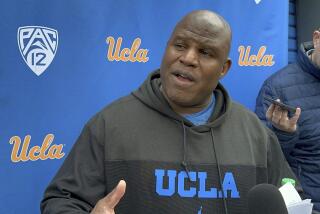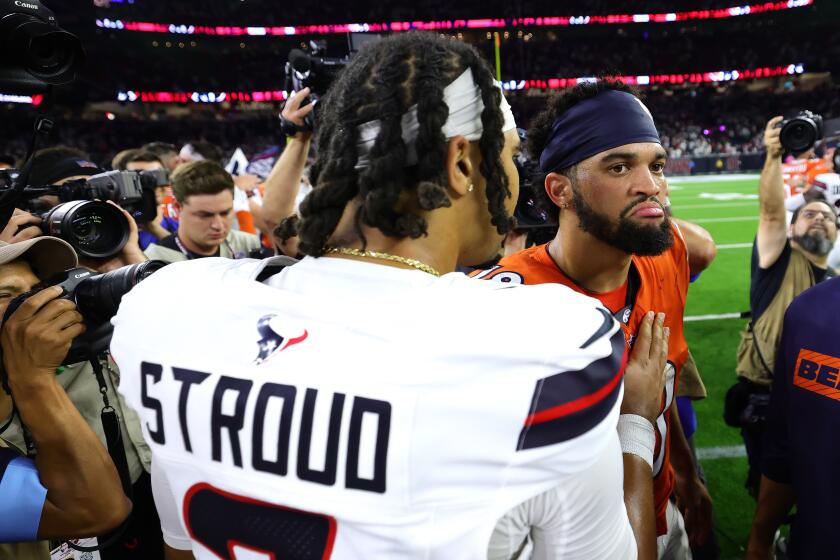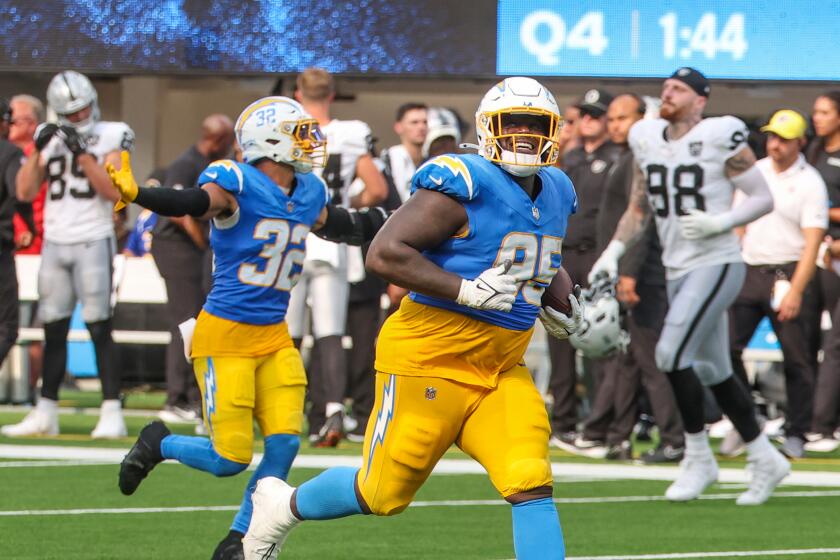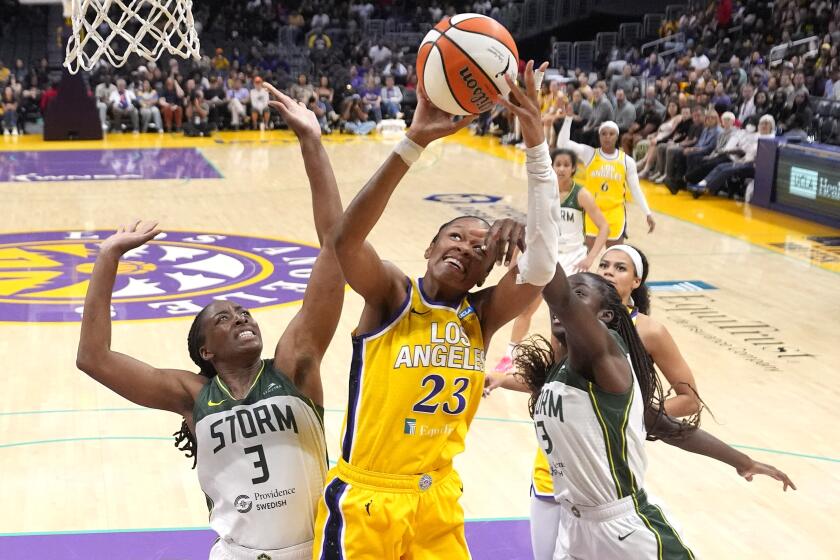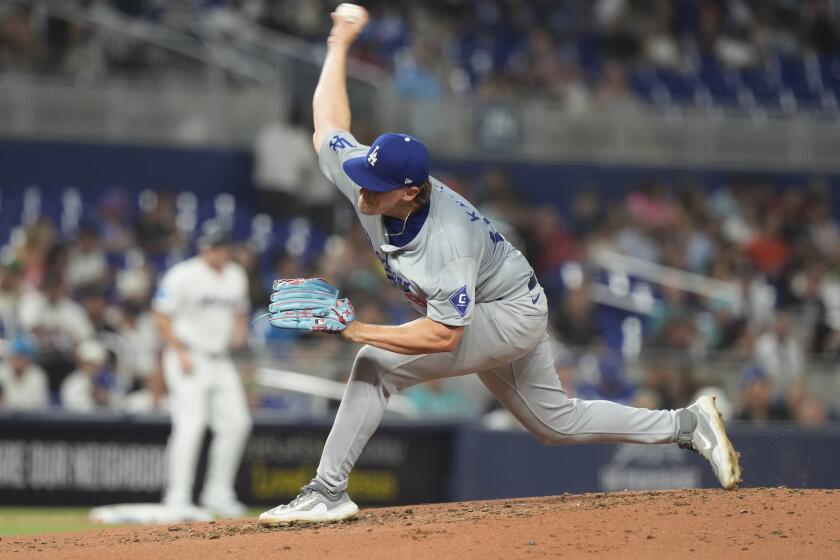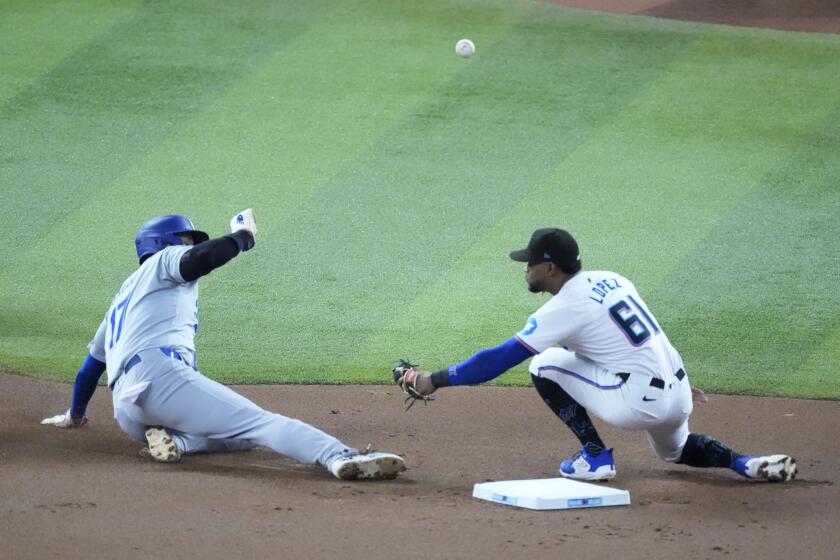Season of Hope : One of Every Twelve Class-A Players Reaches the Majors, but Each Could Be the Next Reggie, Fernando or George
The slogan of the California League: “See the stars of tomorrow where they play today.” Has a nice ring, doesn’t it? In some cases, it’s even true.
Get used to the motto. If plans to bring one of the league’s franchises to Ventura County next year are successful, it will be heard often.
Fernando Valenzuela, George Brett and Reggie Jackson all played in the Class-A league before becoming perennial all-stars in the major leagues.
For them, the California League was simply a short stop on a quick flight to the top. Valenzuela pitched in Lodi, Brett played third base in San Jose and Jackson roamed the outfield in Modesto. Someday, they might all end up under the same roof in Cooperstown, N.Y., at baseball’s Hall of Fame.
And isn’t that the dream of every player who has ever worn sliding pads and stirrups?
Making the dream a reality, however, is not easy. For each player from the California League who makes a major league roster, at least 12 fail.
Those aren’t the best of odds, something that the league’s 225 players know only too well.
Said Todd Oakes, a pitcher for the Fresno Giants: “At this level, everyone is a long shot, but you always think you’re going to make it. You have to. That’s what has to keep you going.”
To the winners go the spoils: A fat major league contract and the memories of a successful minor league career.
Reggie Jackson recalled his California League days in “Reggie,” his best-selling autobiography.
“We were the Modesto Reds, and we could play ,” he wrote. “One day we were losing, 11-0, and we all just sort of grinned in the dugout and said, ‘Let’s get ‘em.’ We got ‘em. (Joe) Rudi hit three home runs over the rest of the game. I hit two. (Dave) Duncan hit two. We ended up winning, 15-13. It was like that in Modesto. A party every game.
“A bunch of us lived in this place called the Carvel Hotel for $6 a day. We traveled around California in buses and laughed a lot. . . . I would wake up every morning and think, ‘This ain’t a bad way to make a living, now is it, Reggie?’ ”
Unfortunately, not every player is as talented as Jackson, who hit 21 homers and drove in 60 runs in only 56 games for Modesto during the 1966 season.
The minor leagues can give a rude awakening to players who have starred throughout their baseball careers. Suddenly, they are thrust into the unfamiliar position of having to prove their worth daily. Some experience failure for the first time.
“When you coach on this level,” said Redwood Pioneers Manager Tom Kotchman, “you’re a father, mother, psychologist to each one of your players. Sometimes, teaching the physical aspects of the game come secondary to putting your players back together mentally. Some of them have a tough time adjusting, whether their problem is being away from home, the travel, or simply the tougher competition.”
Bob Grandstaff, third baseman for the Reno Padres, said illusions about the level of competition in Class-A are quickly dispelled.
“Some guys think they can start right out in Double-A, but it’s just not that easy,” said Grandstaff, who was drafted out of Arizona State. “They find out, and soon. It’s a better brand of baseball than in college.”
Will Clark, the San Francisco Giants’ first draft choice this year, said that pitchers in Class A “throw harder, hit better spots and make fewer mistakes” than ones he saw while playing for Mississippi State.
“We played against some good teams in college, but the quality wasn’t as high day after day like it is here,” Clark said. “Those pitchers with great forkballs or wicked curves that you saw once a week in college are all here. Sometimes, you see more than one a night. It’s like one big, continuous all-star game.”
Of the nine teams in the California League this season, eight have player-development contracts with major league organizations. San Jose is the exception.
As big league ballclubs sign players, they send them to minor league affiliates. Major league teams usually have at least two rookie teams, two Class-A teams (high and low), a Class-AA team and a Class-AAA team.
The California League is considered by most organizations to be a high-A league, or the third rung of the ladder.
Steve Boros, coordinator of instruction for the San Diego Padres, said that a player ideally moves up a level a year.
“The progess from ‘A’ or rookie ball to the majors should take about 3 1/2 years,” he said. “An exceptional player may make it quicker, but we try to establish with the players that skipping a level is the exception rather than the rule.
“Some players just need extra polishing and have to stay at the same level for a couple of years. It’s not that they’re necessarily any less of a prospect. Maybe they were a designated hitter in college and they need extra work on their defense. We try and wait until we can make sure a player will be comfortable where we send him.”
As long as they don’t send him out.
The threat of being released is the constant companion of a minor league ballplayer.
“It’s something you try not to think about, but the possibility is always there,” said Tim Casey, an outfielder on the Stockton Ports. “You have to resign yourself to the fact that all you can do is your best. Maybe it’s good enough and maybe it’s not.”
Said Giants manager Wendell Kim: “I tell my players that they have a chance as long as they have a uniform.”
And sometimes even when the uniform is taken away, the dream refuses to die.
A little more than two years ago, Phil (Fuzzy) Smith temporarily became one of the game’s casualties. After two all-star seasons with Houston Astros’ Sarasota, Fla., rookie team and Daytona Beach, Fla., Class-A team, he was released.
“I was hitting .368 in the spring when they let me go,” said Smith, an infielder. “I couldn’t understand it. I was doing so well. I thought I was on my way to the big leagues.”
Smith, 25, was out of baseball for two years before earning a spot on the San Jose team in a public tryout this spring.
“I wanted to be out of the minors and in the big leagues in three years,” Smith said. “My first two years were great and I left the minors, but not the way I originally planned. It’s kind of funny now, but it was no joke then.
“I have no plan at all anymore. Anytime I can make it to the bigs is OK with me. Just as long as I eventually do make it.”
It took Maury Wills nine years.
Most players set an itinerary for themselves upon being assigned to a minor league team. If they are not progressing toward the big leagues at a certain pace, they say, they will quit.
Usually, they don’t.
When Ty Van Burkleo signed a free-agent contract out of Valley College, he said he would spend no more than three years in the minor leagues.
Four years later, he is still in Class-A.
After 2 1/2 years in the Milwaukee Brewers organization, Van Burkleo was released. Although his three-year limit was almost up, he found it impossible to retire.
“June 26, 1984, was the worst day of my life,” he said. “I was devestated. They told me that they didn’t consider me a prospect anymore. I told them that I knew I wasn’t through.”
Van Burkleo, 22, was signed by the California Angels organization this spring and assigned to their Rohnert Park, Calif., franchise.
With him went his wife of two years, Christine. They were married seven months before the Brewers released him.
“My girlfriends back home (in the San Fernando Valley) think I’m crazy,” Christine said while sitting in the stands during a game. “They don’t understand how I can keep moving with him all the time. He was in Peoria first, then Stockton, then he went to Alaska, and now we’re here.
“I knew when I married Ty that it might be like this. At this level, there are no guaranties.”
Christine, who is 5 1/2 months pregnant, works in the Rohnert Park ticket office to help supplement Ty’s income, which is less than $800 a month.
“He’s doing the best he can and I’m sticking with him,” she said. “Actually, it’s kind of fun. We’re young and can bounce back from adversity. This can’t drag on too long, though. Not with the baby coming.”
It is so very easy to let it happen, though. Stockton outfielder Joe Bruno, 27, knows.
Bruno almost made it to the big leagues. He advanced as far as Triple-A in the Philadelphia Phillies organization before being released in 1983. “Five years to come so close,” he said. “Then it all went down the tubes.”
Bruno was playing in the Mexican League this spring when the Brewers organization contacted him. “They said they needed a fill-in at Stockton,” he said. “I said, ‘I’m on my way.’ ”
Bruno, 27, said that he no longer considers himself a major league prospect. “I have a role,” he said. “There was a time when I really believed I was going to make it, but not anymore. Now, I’m playing because I want to make sure I’ve given baseball my all before I get out. Maybe some team will want me as a coach.”
The competition among coaches in the minor leagues is as stiff as among the players.
Said Kotchman, the Pioneers’ manager: “We’re just like the players. We’re trying for a chance at the big leagues.”
Kim, the Giants manager, advanced as far as Triple-A in a six-year minor league career as an infielder. He hopes to finally break into the majors as a coach.
Said Kim: “I love the minor leagues, but I’d like to be in the majors at least five or six years. Whatever is long enough to qualify for the pension plan I’d settle for. I’d like that for the sake of my family. Then, I would gladly come back. I have a lot to contribute here.”
Jethro McIntyre is also enjoying his stay in the league, but has plans to move on.
“Someday I know I will coach in the big leagues,” said McIntyre, who played for nine years in the minors with the Cincinnati and Cleveland organizations. “Until then, I am very happy here. The Cal League is a good league. It’s gravy compared to what I went through as a player.
“The competition is good, the weather isn’t too hot, and the trips aren’t too long. In the Texas League, we used to make the trip from El Paso to Shreveport by bus without air conditioning. We’d each lose six pounds just sitting there for the ride. There’s nothing like that in this league. Every aspect of managing in this league, I enjoy.”
Except one.
“The only part I don’t like is when I have to release a player,” McIntyre said. “I don’t think I’ll ever learn to enjoy, or even accept, that part of the job. Some of the players get real mad. They’re convinced they can play and they set out to make me a liar.
“I always hope they do.”
More to Read
Go beyond the scoreboard
Get the latest on L.A.'s teams in the daily Sports Report newsletter.
You may occasionally receive promotional content from the Los Angeles Times.


